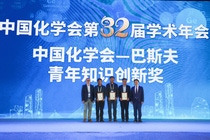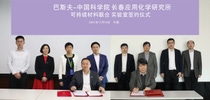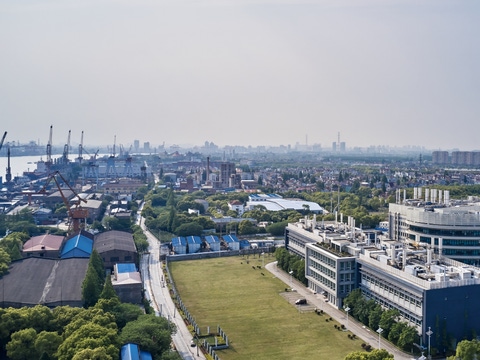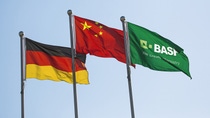BASF in Greater China 2021
Innovation
Innovation is the bedrock of BASF’s success as a leading chemical company and is the key driver for its profitable growth. Asia is now the largest chemical market and there is a growing demand for more sustainable products and solutions. We focus on developing sustainable solutions for our customers by helping them to reduce their carbon footprint, use resources more efficiently and manufacture products in a more environmental friendly way. This is how we safeguard our competitiveness in the long term and make our contribution to society.
.jpg)
BASF is strengthening its innovation capabilities in Asia by breaking ground for the third phase of its Innovation Campus Shanghai
BASF has been continuously expanding its research and development footprint in Asia Pacific to drive innovation by integrating customer and market needs at an early stage. BASF operates two Innovation Campuses in Shanghai, China, and Mumbai, India.
The Innovation Campus allows BASF to bring together all the stakeholders in the innovation chain including research and development (R&D), business and production units in an integrated site. Each Innovation Campus is an integral part of BASF’s global Know-How Verbund and runs global, regional and local R&D projects.
The Innovation Campus Shanghai, located at the BASF Shanghai Pudong Innovation Park, was inaugurated in 2012, and expanded in 2015 and 2019. Combining technical development capabilities of the operating divisions with industrial design expertise, the Innovation Campus Shanghai serves the innovation demand of almost all major industries.
In April 2021, BASF broke ground for the third phase of its Innovation Campus Shanghai. The expansion includes an additional R&D building and one R&D workshop building. Upon its completion in early 2023, the total investment of BASF into its Innovation Campus Shanghai will sum up to around €280 million.
The Innovation Campus Mumbai, with complementary research focusing on crop protection and specialty chemicals, is an important pillar of BASF’s growing R&D network in Asia Pacific. It includes state-of-the-art laboratories for chemical synthesis, application and process development, as well as analytics. The Innovation Campus Mumbai brings all new and existing R&D activities in India under one roof. It is located next to the office building and production plant of BASF’s Thane site in Navi Mumbai. In 2021, BASF inaugurated a new facility in analytics for reverse phase purification of molecules at Innovation Campus Mumbai and further strengthened its research pipeline, particularly in crop protection.


BASF celebrates the 20th anniversary of CCS-BASF Youth Innovation Prize
BASF places great value on open innovation through close collaboration with academic and industry partners around the world. It maintains a global network of around 280 partners from universities, institutes, and companies, forming a key pillar of BASF’s global Know-How Verbund. In Asia Pacific, the Network for Asian Open Research (NAO) has been a joint platform steered by BASF as well as leading universities and institutes in the region since 2014
In 2021, BASF and Chinese Academy of Sciences (CAS) opened a joint lab on sustainable materials in Changchun, China. Drawing on Changchun Institute of Applied Chemistry’s (CIAC) research capabilities and leveraging BASF’s deep expertise to explore next-generation sustainable technologies, the joint lab will integrate the R&D strengths of the two parties to accelerate the speed-to-market.
BASF and CAS established an advisory committee made up of BASF experts and renowned scientists in the field of sustainable materials in China. The advisory committee will review R&D project proposals initiated from the joint lab and provide strategic guidance to explore research frontier as well as to drive sustainable technologies.
Since the establishment of NAO, BASF and its partners have completed more than 100 joint research projects. Currently, NAO projects cover a wide range of research areas including new monomers, polymers and its applications, surfaces and interfaces, coatings, catalysis, battery materials, chemical and process engineering, bioscience, as well as digitalization and smart manufacturing in R&D. For example, BASF is partnering with Sichuan University to explore improved solutions addressing important market needs such as high chemical resistance of polyamide blends.

BASF and Chinese Academy of Sciences launched a joint lab on sustainable materials.
Innovation in chemistry is driven by talents, especially dedicated, high-calibre scientists. BASF presented the 10th CCS-BASF Youth Innovation Prize to four Chinese scientists at the 32nd Chinese Chemical Society (CCS) Annual Congress in Zhuhai, acknowledging their outstanding achievements through discoveries in chemistry. Since the establishment of CCS-BASF Youth Innovation Prize in 2001, BASF has been committed to fostering rising stars in China’s chemistry academia through funding support. 2021 also marked the 20-year milestone of the award.
Since the award’s inception in 2001, BASF aims to encourage and fund outstanding Chinese young scientists in their innovative research areas, including petrochemicals, polymer materials, fine chemicals, surface and colloid chemistry, and bio-engineering. Over the past 20 years, more than 300 scientists have applied, and 40 outstanding young Chinese scientists have been awarded. Among them, seven have become academicians.
BASF is supporting talents at all levels. BASF nurtures students across Asia via the NAO platform. In addition, our Industrial Post-Doc Station in Greater China was officially approved by the Chinese government and welcomed its first industrial Post-Doc in 2021. BASF has also set up a vocational training center in Shanghai to develop a tailor-made program for lab assistants.




